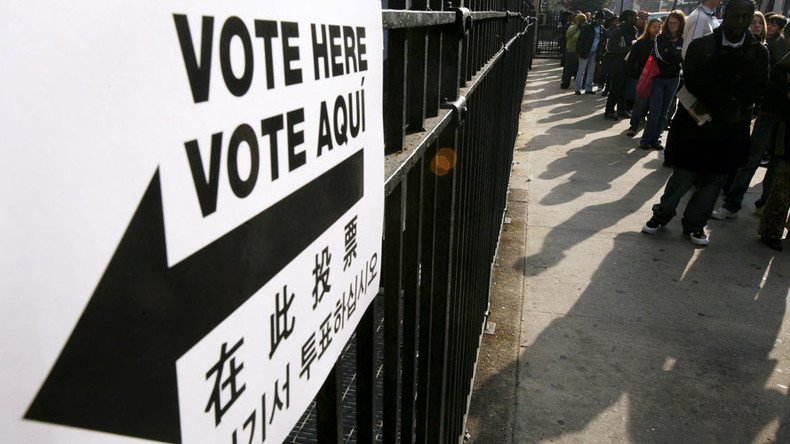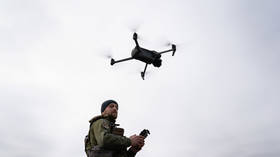NY voters file lawsuit on eve of primary alleging ‘a threat to the democratic process’

Hundreds of voters in New York are expected to file a lawsuit against the state Monday claiming their party affiliation was changed without their consent and they cannot vote in Tuesday’s hotly-contested primary.
The lawsuit, which is being filed by Election Justice USA, calls for New York to switch to an open system allowing anyone to vote in the primaries, regardless of their party affiliation.
New York, please bear in mind that many people's voter registration records have been tampered with. Verify here:https://t.co/7beienhb93
— Berning Sandstorm (@BerningSandstrm) April 17, 2016
An online petition has also gathered more than 7,000 signatures calling for the New York Democratic Party to open the 2016 primary to independent voters.
@jeromecoleman63 You are laughing about #electionfraud.
— California 4 Bernie! (@CamelotGypsy) April 18, 2016
I am very concerned when ppl can't vote.
Aren't you? pic.twitter.com/LR6RDzrJiF
As per the rules of the New York system, unregistered voters had until March 25 to register, while those wanting to change party affiliation had to do so by October 9, 2015.
Numerous voters reportedly have discovered since those deadlines that their party affiliation was altered from Democratic or Republican to “Not affiliated” or “Independent”, two categories that are not eligible for the primary.
Feeling 'Guilty': 2 of Trump's kids miss register deadline, can't vote in NY primary https://t.co/eKo4YDL2Kgpic.twitter.com/Yj7LZ0RRKC
— RT (@RT_com) April 12, 2016
Shyla Nelson, a spokeswoman for Election Justice USA, told the Daily News that such changes were “devastating” and that people had “the electoral process deprived of them.”
Shyster lawyers perpetuating election fraud ought to be a wake up call to all Americans. If our vote is null & void, we're just like Cuba.
— Rockin Robin (@greeneyes0084) April 18, 2016
“If the primary were open, this would be a non-issue for thousands of registered voters that have had this happen to them,” Nelson said. “By making the primary open, it eliminates one of the most vexing problems New Yorkers have dealt with in this primary season.”
“It’s a threat to the democratic process,” he added.
URGENT check your New York Voter Registration at https://t.co/5miibAvtKV IS YOUR BALLOT SWITCHED? #NewYorkPrimarypic.twitter.com/tDHGqPkVDq
— Mariel in Boston (@MARIELinBOSTON) April 15, 2016
Angered voters have also taken to Facebook where posts detailed how their registration has changed without their knowledge.
Others used the Twitter hashtag #ElectionFraud, claiming the registration mixups is a concerted effort by the Hillary Clinton campaign to ensure that Bernie Sanders does not win the crucial state.
Please get info out to other NY voters. Pass it on to any voters it may effect. Thanks! Help stop #ElectionFraud!! pic.twitter.com/8puEwLIwZy
— ☕ Bernie Sanders (@BernersUnited) April 18, 2016
This #electionfraud in NY is caused by @DWStweets and @HilaryClinton. Cheating is the only way Hillary can win.https://t.co/sApTJarKAa
— Jody Coyote (@JodyCoyote12) April 17, 2016
I am with you Claudia Will not vote for her with all the #ElectionFraud against Bernie I will not accpt her "wins" https://t.co/rcuX4OcWMw
— margaret gerhold (@magsagain2) April 16, 2016
Same $hit, diff election. This is what comes of @NGPVAN running Dem data; they're in bed w/ #HRC. #electionfraudhttps://t.co/CFENU0dfZi
— GÖÖNRGRRL (@GoonrGrrl) April 14, 2016
There have also been similar registration issues reported in California, Connecticut, Maryland, and Pennsylvania.
Seriously I hope someone is documenting fraud and corruption by DEMOCRATS so they can be charged w election fraud...go to prison. #WAcaucus
— Caligirl22 (@Twitlertwit) April 18, 2016
Most controversial to date, however, has been in Arizona where voters discovered they were unable to vote in March’s Democratic primaries as their registration had changed without their consent and many only found out the morning they went to vote.
The last state Hillary won is Arizona - and it's currently being investigated for election fraud
— Jonathan Jewel (@JonathanJewel) April 10, 2016
Hundreds took to social media and sites such as Reddit to air their grievances on how their registration had been changed to “Other” or “None”, while also dealing with the fact that there had been a massive cut to the number of polling stations which caused very long lines.
The Department of Justice is now investigating the matter to determine whether the state's largest county complied with voting rights laws, while Hillary Clinton and Bernie Sanders are reportedly going to sue Arizona over its “history” of voting rights problems.
Anonymous have said that the use of SQL databases by Arizona’s Secretary of State website has, like many other SQL databases, a “structural flaw” which can be easily hacked. So easy, in fact, that the group say it “can literally be taught to a toddler,” leaving any data in such a way open to being leaked or changed without notice.
191 million US voter registration records leaked online – report https://t.co/KKUTQOkxa1pic.twitter.com/njOyXAT4aw
— RT (@RT_com) December 29, 2015
In December, a database containing the personal information of 191 million voters was discovered by a security researcher online, although it was unclear who owned the database.
Included in the data were voter names, home addresses, IDs, phone numbers, and birth dates, as well as political affiliations and voting histories since 2000.













